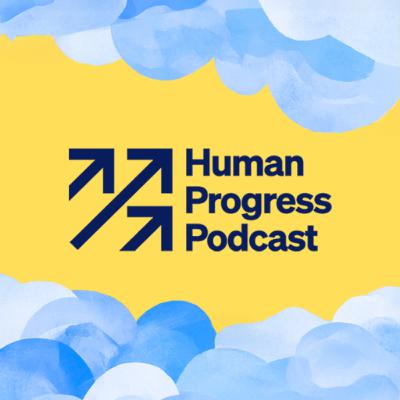Discover The Human Progress Podcast
The Human Progress Podcast

76 Episodes
Reverse
Our editor Marian Tupy speaks with writer and policy scholar Brink Lindsey about his new book The Permanent Problem: The Uncertain Transition from Mass Plenty to Mass Flourishing.They discuss why material abundance produces dissatisfaction, the decline of marriage and community, bureaucratic stagnation, and the cultural and institutional innovations needed to produce mass satisfaction without scarcity.
Environmentalists often claim that solving climate change requires scarcity: less energy, less consumption, and less economic growth.Zion Lights, a former radical environmentalist, now argues the opposite—that energy abundance is necessary for both thriving human societies and environmental protection. Her latest book, Energy Is Life, tells the story of her journey from Extinction Rebellion activist to outspoken advocate for nuclear power.In this episode of The Human Progress Podcast, Zion Lights joins Chelsea Follett to discuss how modern environmentalism became fixated on scarcity, how nuclear power became so misunderstood, and why energy is essential to human wellbeing.
Johan Norberg examines the conditions that create human flourishing and why golden ages so often come to an end.Buy his book, Peak Human.
Psychologist Chris Ferguson joins Adam Omary to discuss American mental health, cognitive biases, and the dangers of narrative overreach.Buy his book, Catastrophe!: How Psychology Explains Why Good People Make Bad Situations Worse.Read his article on loneliness.
Scott Winship joins Marian Tupy to discuss how bad measurement choices distort the picture of poverty and inequality in the United States.
Yaron Brook joins Marian Tupy to discuss the pessimistic populism of the New Right.
Policy analyst Marcos Falcone joins Chelsea Follett to discuss Milei’s recent electoral success and the economic reforms he might pursue using this new political leverage.
Peter Boettke joins Marian Tupy to examine the institutional foundations of the modern world. Check out his book, The Historical Path to Liberty and Human Progress.
Sarah McLaughlin joins Chelsea Follett to discuss the rising influence of foreign authoritarian governments on college campuses.Check out her book, Authoritarians in the Academy: How the Internationalization of Higher Education and Borderless Censorship Threaten Free Speech.Please note that we recorded this interview before Kirk’s murder, so he is not mentioned, though we believe that event makes conversations like this one even more relevant.
Bryan Caplan joins Marian Tupy to discuss the relationship between formal education and innovation.Check out his book, The Case against Education.
Psychology researcher Tim Lomas joins Chelsea Follett to explore surprising global trends in happiness, meaning, mental health, and more.
Economist Donald Boudreaux joins Marian Tupy to discuss important misconceptions about American economic history and why it’s crucial to set the record straight.Learn more in his book, The Triumph of Economic Freedom: Debunking the Seven Great Myths of American Capitalism.
Philosopher and author Maarten Boudry joins Chelsea Follett to examine the cultural and ideological roots of Western anti-Western sentiment.
Tyler Cowen joins Marian Tupy to discuss the New Right, the relationship between freedom and progress, and whether classical liberalism is equipped to meet today's political challenges.
Marian Tupy speaks with writer and political thinker Matt Johnson about historicism, progress, and how tribalism and the “desire for recognition” are testing the foundations of open societies.
Stephanie Murray joins Chelsea Follett to discuss discourse around falling birth rates, the tension between pro-natalism and classical liberal values, and how it might be resolved.
Scott Lincicome joins Marian Tupy to discuss how President Trump's trade policies will affect American prosperity, national security, government revenue, and industry.
Daniel Griswold, the former director of the Cato Institute’s Center for Trade Policy Studies, joins Chelsea Follett to discuss the true legacy of globalization.
Existential psychologist Clay Routledge joins Chelsea Follett to discuss how Americans think about the future, recent trends in mental health, the alleged "crisis of meaning," and how nostalgia can drive progress.
Jon Moynihan, a businessman, author, and life peer, joins Marian Tupy to discuss why economic growth matters and how the UK and other social democracies can avoid financial collapse, economic stagnation, and long-term deterioration in living standards.





